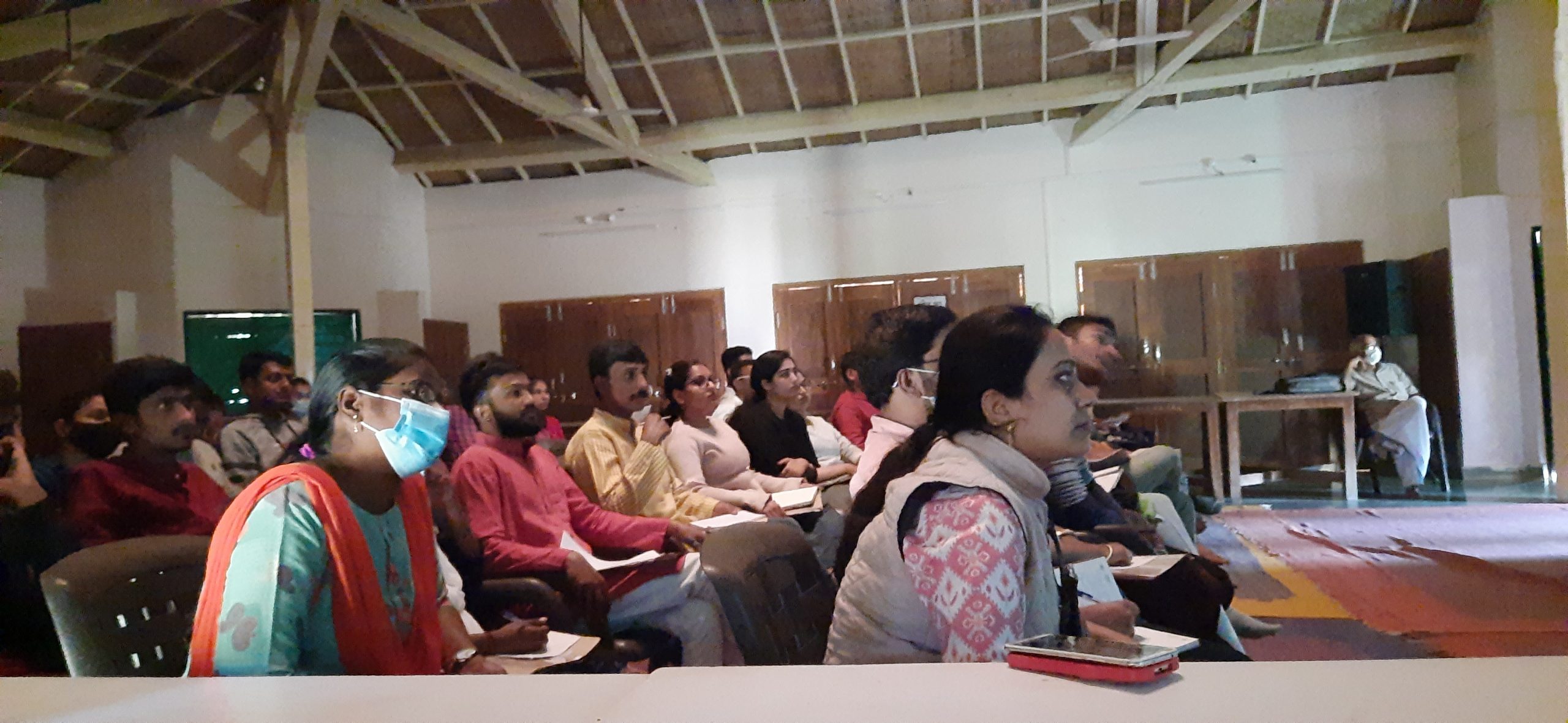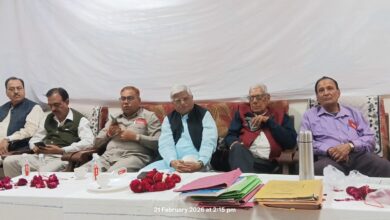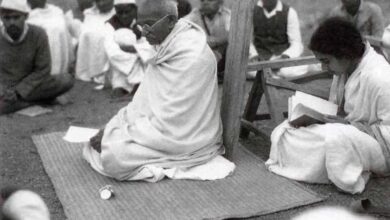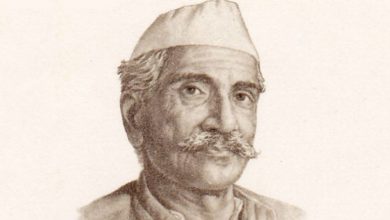Short Term Course on Gandhian Thought and Action inaugurated at Sevagram Ashram
The Camp began with the reciting of Mahatma’s favourite Bhajan, Vaiṣṇava Jana to tene kahiye je pīḍa parāyī jāṇe re…. It was recited by Ms Sobha Tai, Trustee of the Ashram. Shri TRN Prabhu, President of Sevagram Ashram Pratishthan welcomed the participants of the camp. In his introductory remarks, he briefly explained the last will and testament of Gandhi and how Sarva Seva Sangh and Sarvodaya Samaj were formed after the assassination of Mahatma to carry out his mission.
Dr Siby K. Joseph
The inaugural session of the Winter Camp/Short Term Course on Gandhian Thought organized from 23 -27 December 2021 took place at the Seminar Hall of Yatri Niwas on the morning of 23 December. In this residential short term course on Gandhian Thought and action, about 50 university students from different parts of India have enrolled as participants. The objective of this short term course/camp was to acquaint the students with the life and work of Mahatma Gandhi and its relevance in humanity’s current predicament. The winter camp was organized by Sevagram Ashram Pratishthan, Wardha. Sri Jamnalal Bajaj Memorial Library Research Centre of Sevagram Ashram Pratishthan is instrumental in coordinating this course. This centre was established by Sevagram Ashram Pratishthan recently to create and offer facilities to study and research on the life, thought and methods of Gandhi, and to learn lessons that can be of value in addressing the problems humanity is confronting at present.
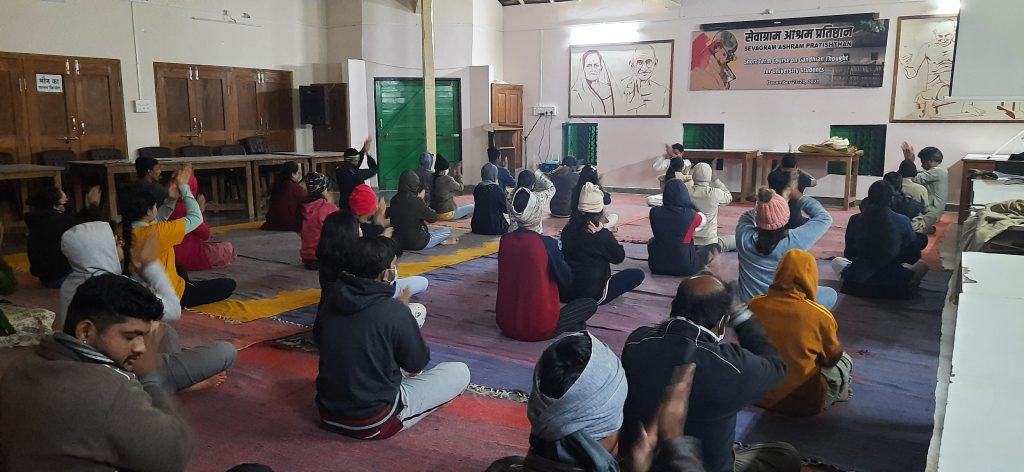
The Camp began with the reciting of Mahatma’s favourite Bhajan, Vaiṣṇava Jana to tene kahiye je pīḍa parāyī jāṇe re…. It was recited by Ms Sobha Tai, Trustee of the Ashram. Shri TRN Prabhu, President of Sevagram Ashram Pratishthan welcomed the participants of the camp. In his introductory remarks, he briefly explained the last will and testament of Gandhi and how Sarva Seva Sangh and Sarvodaya Samaj were formed after the assassination of Mahatma to carry out his mission. Shri Chandan Pal, President of Sarva Seva Sangh inaugurated the camp by lighting the traditional lamp. The dignitaries and resource persons present on the occasion and representatives of students also joined him in lighting the lamp. In his inaugural address, he stated that Gandhi was not a philosopher like Karl Marx and others. He was an exemplar, a role model to emulate. He was the only one who could say “My life is Message.”
Gandhi was a multifaceted personality who made tremendous contributions in different spheres of life. Though he was constantly engaged in socio-economic and political actions, he made indelible imprints even in the field of journalism. He took the responsibility of publishing Indian Opinion, Young India, Navajivan and Harijan in English, Hindi and even in regional languages. He wrote Hind Swaraj with great passion using his right and left hand in 1909. Even after a century, the ideas discussed in this work are constantly debated and it shows the prophetic message of Gandhi. He raised the question: what is development? Development is usually equated with affluence, technological advancement, the standard of living, an increase in GDP and so on. How did Gandhi measure development? He gave us the talisman “Recall the face of the poorest and the weakest man whom you may have seen, and ask yourself, if the step you contemplate is going to be of any use to him.” The development which brings joy into the life of the poor and downtrodden was his concern.
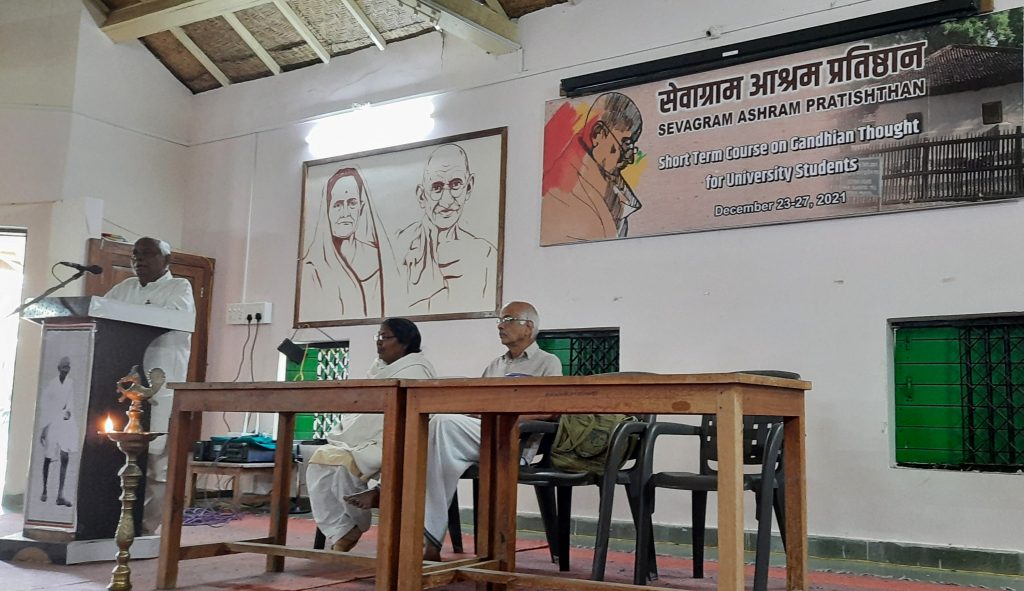
Through his Ashrams at Phoenix Settlement (1904), Tolstoy Farm (1910), Kochrab Ashram (1915) Sabarmati Ashram (1917) and Sevagram Ashram (1936) he experimented on the twin principles of Truth and nonviolence and engaged in various actions for the creation of a nonviolent society. He conducted major political struggles Noncooperation Movement 1920, Dandi March 1930 and Quit India Movement 1942 with a gap of 10 years. The beauty of Gandhi is that he combined combat with constructive action. He was aware of the significance of constructive action which brings positive vibes while engaged in struggle.
While sharing his experience in the field he stated that though he was engaged in Tsunami relief work, Naxal affected areas, the most memorable was Kokrajhar peace mission in Assam bringing the warring communities into the path of peace. The source of inspiration for this work was Gandhi’s peace mission in Calcutta which was described as “the Miracle of Calcutta”. He said that initially, the government was not willing to give permission. The peace team could visit the villages with security forces. You cannot do peace with security forces.
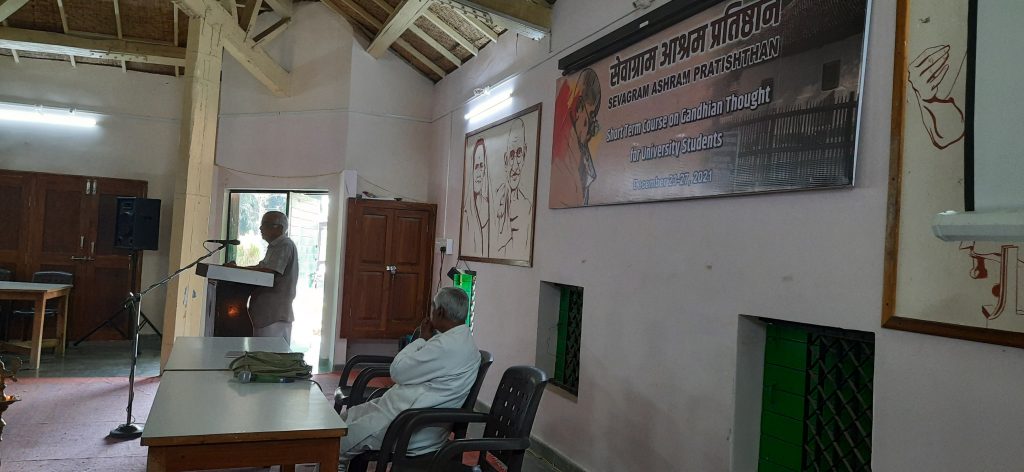
The team declined the offer. But finally, the Governor granted the permission and incessant efforts for five years created the desired results. He pointed out the fact that people were not permitting him to stay there even for a single day but following the path of nonviolence, he could stay there for five years. That is the power of Gandhi’s nonviolence. He also shared the cycle yatra from Kokrajhar to Kashmir with youngsters for spreading the message of this mission. In his concluding remarks, he said with three shots Gandhi was assassinated. These three bullet shots represented the following: 1. Religious parochialism 2. Fanatic nationalism 3. Narrow patriotism. These three forces are active even today, that is why we have assembled at the premises of historic Sevagram Ashram to learn and understand the philosophy and method of action of Mahatma. It was followed by a question-answer session.
Dr. D. John Chellaurai Professor and HOD, Department of Gandhian Studies, Mahatma Gandhi Mission University, Aurangabad, Shri Bhujang Ramrao Bobade, Founder, Heritage Foundation, Jalgaon, Dr. M. Arunachalam, Chief Organizer, Shanti Sena, Gandhigram Rural Institute, Dindigul were present at the inaugural session and guided the participants of the camp. Dr Siby K. Joseph, Director of Sri Jamnalal Bajaj Memorial Library Research Centre of Sevagram Ashram Pratishthan summed up the discussion and expressed the indebtedness to dignitaries and participants of the camp. Following the introductory and inaugural session, Shri TRN Prabhu, President of the ashram addressed the students on the philosophy and contemporary relevance of Sarvodaya. In order to get acquainted with the life of Gandhi and India’s struggle for freedom the documentary Mahatma Gandhi: Life of Gandhi directed by Vithalbhai K. Jhaveri and produced by the Gandhi Memorial Fund in collaboration with the Films Division, Government of India was screened in two parts.
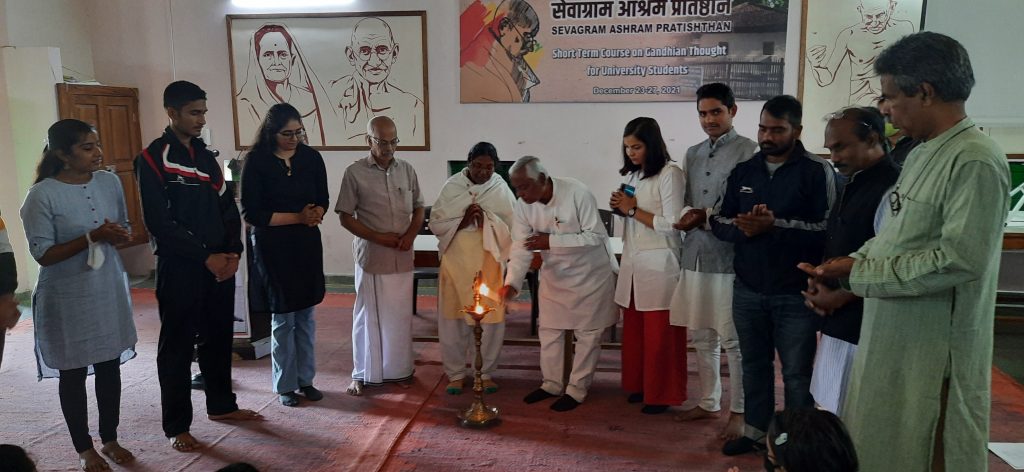
The participants of the course thanked the organizers for providing the unique opportunity to lead the simple and enriching life of the Ashram and experience alternative ways of life. Prayer, Yoga, Community work, field visits to the Paunar Ashram and constructive work organizations in Wardha, screening of films, group discussions, exhibition cum sale of books, introduction to spinning and Khadi and cultural events are the unique features of the camp. Noted Scholars and Activists like Prof. William Baskaran, Dean Faculty of Social Sciences, Gandhigram Rural Institute (GRI), Tamil Nadu;Ms. Radhaben Bhatt, Former Chairperson, Gandhi Peace Foundation, New Delhi, Dr. Ravichandran, Director, Gandhian Constructive Programme , Museum,GRI and others guiding the discussions of the camp.
A webinar on the Philosophy of Constructive Programme and Today’sIndia is intertwined with the camp. This webinar is guided by Prof. Ram Prakash Dwivedi, Former Director, Gandhi Adhyanpith and former Dean, Faculty of Social Work, Mahatma Gandhi Kashi Vidyapith, Varanasi, Shri Ram Dhiraj, Member, National Executive,Sarva Seva Sangh, Prof. Prem Anand Mishra, Dean, Faculty of Gandhian Studies, Gujarat Vidyapith, Ahmedabad and others. This Webinar is the 10th Webinar of Time Demands Gandhi organized by Sevagram Ashram Pratishthan, Wardha, Maharashtra in association with Gandhian Collective India and Faculty of Gandhian Studies, Gujarat Vidyapith, Ahmedabad. A special session / practical demonstration of some products which we use in our day to day life are also arranged with the help of Mahatma Gandhi Institute of Rural Industrialization, Wardha for the benefit of the students.
(This report is prepared by Dr Siby K. Joseph, Director, Sri Jamnalal Bajaj Memorial Library Research Centre, Sevagram Ashram Pratishthan, Sevagram Wardha-442102, Maharashtra Email:directorjbmlrc@gmail.com)
Must Read :

